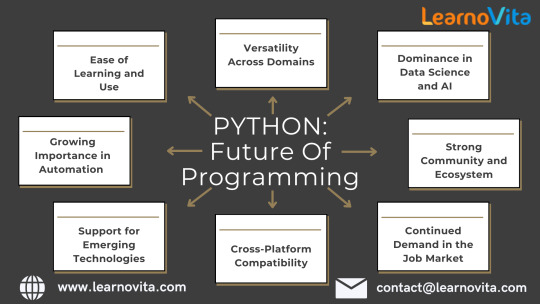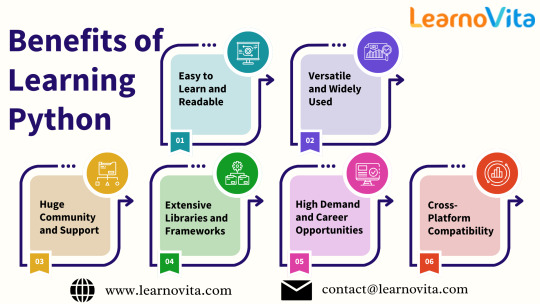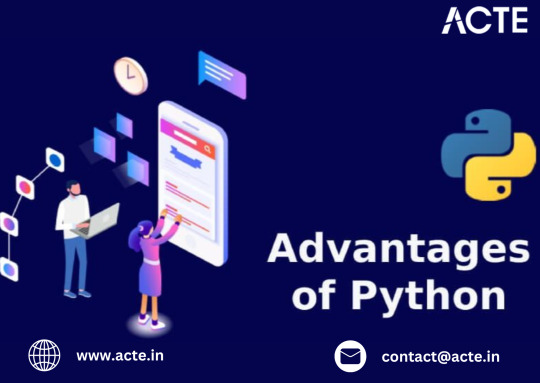Don't wanna be here? Send us removal request.
Text
Python for Beginners in 2025: Key Benefits and Career Opportunities
Python continues to be a top choice for beginners entering the world of programming in 2025. Its simplicity, versatility, and widespread use across industries make it a practical and rewarding language to learn. Considering the kind support of Python Course in Chennai Whatever your level of experience or reason for switching from another programming language, learning Python gets much more fun.

Whether you want to build websites, analyze data, or explore artificial intelligence, Python is a strong foundation to start with. Here’s why Python remains a smart investment for your future in tech.
Simple and Beginner-Friendly Python’s syntax is clean, readable, and closely resembles everyday English, which helps beginners understand programming logic without getting overwhelmed. You can start writing useful code quickly, even with little to no prior experience, making it ideal for those new to coding.
Versatile Applications One of Python’s standout features is its versatility. It’s used in many areas, including web development, data science, machine learning, automation, game development, and even cybersecurity. This means that by learning one language, you open doors to a variety of career paths and projects.
High Demand in the Job Market Python remains one of the most sought-after skills in the tech job market. Employers look for Python developers across startups, established tech companies, and industries such as finance, healthcare, and retail. With Python on your resume, you increase your chances of landing interviews and high-paying job opportunities. With the aid of Best Online Training & Placement Programs, which offer comprehensive training and job placement support to anyone looking to develop their talents, it’s easier to learn this tool and advance your career.

Strong Community and Learning Resources Python has a huge and active global community. Beginners can benefit from forums, tutorials, documentation, and peer support. If you get stuck or want to try something new, there’s always help available. The abundance of resources makes self-learning more accessible and less intimidating.
Excellent for Career Growth Once you learn the basics, Python lets you grow into more advanced areas. You can explore frameworks like Django and Flask for web development, or dive into libraries like Pandas, NumPy, and TensorFlow for data and AI projects. This scalability helps you evolve as a developer and specialize in high-growth fields.
Future-Proof Skill As technology trends evolve, Python keeps adapting. It’s already a leader in AI and data science, and it's increasingly used in emerging fields like automation, IoT, and blockchain. Learning Python means you’re investing in a skill that will remain valuable for years to come.
Conclusion In 2025, Python is still one of the best programming languages for beginners. It’s easy to learn, highly versatile, and opens up a world of career possibilities. Whether you’re starting from scratch or switching careers, learning Python can be your first step toward a successful future in the tech industry.
#python course#python training#python#technology#tech#python programming#python online training#python online course#python online classes#python certification
0 notes
Text
Why Python is a Top Choice for Web Development: Benefits and Features
Python has carved a strong place for itself in the world of web development due to its simplicity, versatility, and the powerful tools it offers. Whether you’re building a simple website or a complex web application, Python provides the flexibility and efficiency developers need. Considering the kind support of Python Course in Chennai Whatever your level of experience or reason for switching from another programming language, learning Python gets much more fun.

Here’s a look at the main reasons why Python is a favorite in web development.
Readable and Easy to Learn One of Python’s biggest strengths is its readable syntax. It’s designed to be intuitive and close to human language, making it easier for beginners to pick up and professionals to work with quickly. This simplicity speeds up development and reduces the chances of coding errors.
Robust Web Frameworks Python offers several mature frameworks that make web development faster and more structured. Django, Flask, Pyramid, and FastAPI are among the most popular. Django comes with many built-in features that simplify development, while Flask offers flexibility for custom solutions. These frameworks help reduce the time and effort needed to create and maintain web apps.
Fast Development and Prototyping Python allows for rapid development, which is crucial when testing ideas or bringing a product to market quickly. Developers can write and deploy working code faster thanks to Python’s straightforward syntax and powerful libraries.
Large and Supportive Community Python has one of the largest developer communities in the world. This means you can easily find resources, documentation, tutorials, and support for any challenges you face. The strong community also keeps Python updated with the latest trends and tools. With the aid of Best Online Training & Placement Programs, which offer comprehensive training and job placement support to anyone looking to develop their talents, it’s easier to learn this tool and advance your career.

Built-in Security Features Security is a top concern in web development. Python frameworks like Django come with built-in security features to help protect against common threats such as SQL injection and cross-site scripting. This allows developers to build secure applications with less effort.
Cross-Platform Support Python is cross-platform, so applications built with it can run on different operating systems like Windows, macOS, and Linux. This flexibility is especially useful when developing for a broad user base.
Seamless Integration Python integrates well with other technologies commonly used in web development. It works easily with front-end tools like HTML, CSS, and JavaScript and connects smoothly with databases and APIs. This compatibility makes it an excellent choice for full-stack development.
Ideal for Data-Driven Applications If your web project involves data analysis, machine learning, or AI, Python is the perfect language. With libraries like Pandas, NumPy, and TensorFlow, Python allows you to incorporate data processing and intelligence directly into your web apps.
Scalable and Reliable Python is suitable for both small startups and large enterprise applications. It scales well with user growth and can handle increased traffic and complexity without sacrificing performance.
Conclusion Python combines simplicity, speed, and a rich ecosystem of tools to make web development more efficient and powerful. With its user-friendly syntax, strong community, and excellent frameworks, Python continues to be a top choice for developers looking to build modern, scalable, and secure web applications. Whether you're just starting out or working on a major project, Python offers everything you need to succeed.
#python course#python training#python#technology#python programming#tech#python online training#python online course#python online classes#python certification
0 notes
Text
Learning Python Basics: A Step-by-Step Approach
Python is one of the easiest and most powerful programming languages for beginners to start with. Its clean syntax and readability make it a favorite among new learners, while its flexibility and vast community support make it useful across different fields like web development, data analysis, automation, and artificial intelligence. Considering the kind support of Python Course in Chennai Whatever your level of experience or reason for switching from another programming language, learning Python gets much more fun.

If you're new to Python, here's a step-by-step approach to help you get started with the basics.
Start with Understanding What Python Is Before diving into coding, it's helpful to know what Python is and why it's so popular. Python is a high-level, interpreted programming language known for its ease of use and versatility. It's used by companies, hobbyists, and professionals alike. Knowing its applications can give you extra motivation to learn.
Set Up Your Environment To start writing Python code, you need to set up your environment. Install Python on your computer and choose a simple text editor or an Integrated Development Environment (IDE) like IDLE or VS Code. Once you're set up, you can begin writing and running your Python scripts.
Learn the Fundamentals The core basics of Python include understanding variables, data types (strings, integers, floats, booleans), and how to perform simple operations like addition or string manipulation. Learn how to print messages, take user input, and understand basic syntax.
Explore Control Structures Control structures like conditional statements (if, else, elif) and loops (for, while) help control the flow of your program. Practice using them in simple examples like guessing games, calculators, or even creating basic menus.
With the aid of Best Online Training & Placement Programs, which offer comprehensive training and job placement support to anyone looking to develop their talents, it’s easier to learn this tool and advance your career.

Functions and Reusability Functions allow you to write reusable blocks of code. Learn how to define and call functions, pass parameters, and return results. This step is important in making your code more organized and scalable.
Lists, Tuples, and Dictionaries Data structures are essential in storing and manipulating data. Learn how to work with lists, tuples, and dictionaries, which are used frequently in Python programs. Practice accessing, updating, and looping through them to get comfortable.
Practice with Simple Projects Once you have the basics, start building small projects. These could be as simple as a to-do list, a temperature converter, or a number guessing game. These projects reinforce what you’ve learned and help you see how everything fits together.
Debug and Learn from Mistakes Errors are part of programming. Learn how to read error messages and understand what went wrong. Debugging your own code builds confidence and teaches you how to think like a developer.
Keep Practicing and Building The more you code, the more fluent you’ll become. Continue experimenting with new ideas and challenges. As you grow, explore more Python topics like file handling, classes and objects, and external libraries.
Learning Python step by step gives you a solid foundation not just in the language itself but in the broader world of programming. With patience and regular practice, you'll find yourself mastering the basics and ready to move on to more advanced projects.
#python course#python training#python#technology#python programming#python online training#python online course#python online classes#python certification#tech
0 notes
Text
Why Python Will Thrive: Future Trends and Applications
Python has already made a significant impact in the tech world, and its trajectory for the future is even more promising. From its simplicity and versatility to its widespread use in cutting-edge technologies, Python is expected to continue thriving in the coming years. Considering the kind support of Python Course in Chennai Whatever your level of experience or reason for switching from another programming language, learning Python gets much more fun.

Let's explore why Python will remain at the forefront of software development and what trends and applications will contribute to its ongoing dominance.
1. Artificial Intelligence and Machine Learning
Python is already the go-to language for AI and machine learning, and its role in these fields is set to expand further. With powerful libraries such as TensorFlow, PyTorch, and Scikit-learn, Python simplifies the development of machine learning models and artificial intelligence applications. As more industries integrate AI for automation, personalization, and predictive analytics, Python will remain a core language for developing intelligent systems.
2. Data Science and Big Data
Data science is one of the most significant areas where Python has excelled. Libraries like Pandas, NumPy, and Matplotlib make data manipulation and visualization simple and efficient. As companies and organizations continue to generate and analyze vast amounts of data, Python’s ability to process, clean, and visualize big data will only become more critical. Additionally, Python’s compatibility with big data platforms like Hadoop and Apache Spark ensures that it will remain a major player in data-driven decision-making.
3. Web Development
Python’s role in web development is growing thanks to frameworks like Django and Flask, which provide robust, scalable, and secure solutions for building web applications. With the increasing demand for interactive websites and APIs, Python is well-positioned to continue serving as a top language for backend development. Its integration with cloud computing platforms will also fuel its growth in building modern web applications that scale efficiently.
4. Automation and Scripting
Automation is another area where Python excels. Developers use Python to automate tasks ranging from system administration to testing and deployment. With the rise of DevOps practices and the growing demand for workflow automation, Python’s role in streamlining repetitive processes will continue to grow. Businesses across industries will rely on Python to boost productivity, reduce errors, and optimize performance. With the aid of Best Online Training & Placement Programs, which offer comprehensive training and job placement support to anyone looking to develop their talents, it’s easier to learn this tool and advance your career.

5. Cybersecurity and Ethical Hacking
With cyber threats becoming increasingly sophisticated, cybersecurity is a critical concern for businesses worldwide. Python is widely used for penetration testing, vulnerability scanning, and threat detection due to its simplicity and effectiveness. Libraries like Scapy and PyCrypto make Python an excellent choice for ethical hacking and security professionals. As the need for robust cybersecurity measures increases, Python’s role in safeguarding digital assets will continue to thrive.
6. Internet of Things (IoT)
Python’s compatibility with microcontrollers and embedded systems makes it a strong contender in the growing field of IoT. Frameworks like MicroPython and CircuitPython enable developers to build IoT applications efficiently, whether for home automation, smart cities, or industrial systems. As the number of connected devices continues to rise, Python will remain a dominant language for creating scalable and reliable IoT solutions.
7. Cloud Computing and Serverless Architectures
The rise of cloud computing and serverless architectures has created new opportunities for Python. Cloud platforms like AWS, Google Cloud, and Microsoft Azure all support Python, allowing developers to build scalable and cost-efficient applications. With its flexibility and integration capabilities, Python is perfectly suited for developing cloud-based applications, serverless functions, and microservices.
8. Gaming and Virtual Reality
Python has long been used in game development, with libraries such as Pygame offering simple tools to create 2D games. However, as gaming and virtual reality (VR) technologies evolve, Python’s role in developing immersive experiences will grow. The language’s ease of use and integration with game engines will make it a popular choice for building gaming platforms, VR applications, and simulations.
9. Expanding Job Market
As Python’s applications continue to grow, so does the demand for Python developers. From startups to tech giants like Google, Facebook, and Amazon, companies across industries are seeking professionals who are proficient in Python. The increasing adoption of Python in various fields, including data science, AI, cybersecurity, and cloud computing, ensures a thriving job market for Python developers in the future.
10. Constant Evolution and Community Support
Python’s open-source nature means that it’s constantly evolving with new libraries, frameworks, and features. Its vibrant community of developers contributes to its growth and ensures that Python stays relevant to emerging trends and technologies. Whether it’s a new tool for AI or a breakthrough in web development, Python’s community is always working to improve the language and make it more efficient for developers.
Conclusion
Python’s future is bright, with its presence continuing to grow in AI, data science, automation, web development, and beyond. As industries become increasingly data-driven, automated, and connected, Python’s simplicity, versatility, and strong community support make it an ideal choice for developers. Whether you are a beginner looking to start your coding journey or a seasoned professional exploring new career opportunities, learning Python offers long-term benefits in a rapidly evolving tech landscape.
#python course#python training#python#technology#tech#python programming#python online training#python online course#python online classes#python certification
2 notes
·
View notes
Text
The Advantages of Python: A Comprehensive Overview
Python has gained immense popularity in the programming world due to its simplicity, flexibility, and powerful capabilities. Considering the kind support of Python Course in Chennai Whatever your level of experience or reason for switching from another programming language, learning Python gets much more fun.

Whether you are a beginner stepping into coding or an experienced developer working on complex projects, Python offers numerous advantages that make it a preferred choice across various industries.
Easy to Learn and Use
Python is known for its clean and readable syntax, making it an excellent choice for beginners. Unlike other programming languages that require complex syntax, Python allows developers to write fewer lines of code while maintaining efficiency. Its simplicity ensures that even those without prior programming experience can quickly grasp the fundamentals and start coding.
Versatile Across Multiple Fields
One of Python’s biggest strengths is its versatility. It is used in web development, data science, artificial intelligence, machine learning, automation, game development, and even cybersecurity. This flexibility allows developers to transition between different domains without having to learn a new language.
Extensive Library and Framework Support
Python offers a vast collection of libraries and frameworks that simplify development tasks. Libraries like NumPy and Pandas are used for data analysis, TensorFlow and PyTorch for machine learning, Flask and Django for web development, and Selenium for automation. These libraries reduce the time and effort needed to build applications, allowing developers to focus on problem-solving.
Strong Community and Learning Resources
Python has a large and active global community that continuously contributes to its growth. Whether you need help debugging code, finding tutorials, or exploring best practices, numerous forums, documentation, and free learning platforms provide valuable support. This makes Python an ideal language for both self-learners and professionals. With the aid of Best Online Training & Placement Programs, which offer comprehensive training and job placement support to anyone looking to develop their talents, it’s easier to learn this tool and advance your career.

Cross-Platform Compatibility
Python is a cross-platform language, meaning it runs smoothly on Windows, macOS, and Linux without requiring major modifications. This feature enables developers to write code once and deploy it across different operating systems, saving time and effort.
Ideal for Automation and Scripting
Python is widely used for automating repetitive tasks, such as web scraping, file management, and system administration. Businesses leverage Python’s scripting capabilities to improve efficiency and reduce manual workloads. Many developers also use it to automate testing processes, making software development more streamlined.
High Demand in the Job Market
Python is one of the most sought-after programming languages in the job market. Companies across industries, including tech giants like Google, Amazon, and Microsoft, rely on Python for various applications. The demand for Python developers continues to grow, making it a valuable skill for those seeking career advancement.
Integration with Other Technologies
Python seamlessly integrates with other programming languages like C, C++, and Java, making it highly adaptable for different projects. This allows developers to enhance existing applications, optimize performance, and work efficiently with multiple technologies.
Conclusion
Python’s ease of use, versatility, and strong community support make it one of the best programming languages for both beginners and experienced developers. Whether you are interested in software development, data science, artificial intelligence, or automation, Python provides the tools and resources needed to succeed. With its continuous evolution and growing adoption, Python remains a powerful choice for modern programming needs.
#python course#python training#python#technology#tech#python online training#python programming#python online course#python online classes#python certification
0 notes
Text
How to Learn Python as a Beginner: A Practical Approach
Python is one of the most widely used programming languages, known for its simplicity, readability, and versatility. Whether you are new to coding or transitioning from another language, Python is an excellent choice to start with. Considering the kind support of Python Course in Chennai Whatever your level of experience or reason for switching from another programming language, learning Python gets much more fun.

It is used in web development, data science, artificial intelligence, automation, and more. This guide will walk you through a practical approach to learning Python effectively.
Why Learn Python?
Python is popular among beginners because of its clean syntax and easy-to-understand structure. Unlike other programming languages, Python requires fewer lines of code to accomplish tasks, making it beginner-friendly. Additionally, it has a vast ecosystem of libraries and frameworks that simplify development across various domains.
Step 1: Learn the Fundamentals
Before diving into complex applications, it's crucial to understand Python’s basics. Focus on:
Syntax and Variables – Learn how Python handles different data types, including integers, floats, strings, and lists.
Control Structures – Master conditional statements (if-else) and loops (for, while) to control program flow.
Functions – Learn to write reusable code blocks to make your programs efficient and modular.
Data Structures – Get familiar with lists, tuples, dictionaries, and sets for managing data.
Online platforms like W3Schools, Real Python, and official Python documentation are great places to start learning these concepts.
Step 2: Practice with Small Projects
Once you grasp the basics, start working on small projects to reinforce your learning. Some beginner-friendly project ideas include:
A simple calculator
A to-do list application
A guessing game
A password generator
Building real-world projects helps you understand how Python is applied practically.
Step 3: Explore Python Libraries
Python's power lies in its extensive collection of libraries. As you advance, explore the following:
NumPy and Pandas – For data analysis and manipulation
Matplotlib and Seaborn – For data visualization
Flask and Django – For web development
Selenium – For web automation
TensorFlow and Scikit-learn – For machine learning
Each of these libraries opens new opportunities for working in different tech domains.
With the aid of Best Online Training & Placement Programs, which offer comprehensive training and job placement support to anyone looking to develop their talents, it’s easier to learn this tool and advance your career.

Step 4: Join Coding Communities and Courses
Structured learning is crucial for steady progress. Enroll in beginner-friendly Python courses on platforms like Udemy, Coursera, or Codecademy. Additionally, participating in online communities like Stack Overflow, GitHub, and Reddit will help you stay updated and solve coding challenges with the support of experienced developers.
Step 5: Solve Coding Challenges
Practicing coding problems sharpens your problem-solving skills and prepares you for technical interviews. Websites like LeetCode, HackerRank, and Codewars provide interactive Python challenges that help improve logical thinking and coding efficiency.
Step 6: Work on Advanced Projects
Once you're comfortable with Python, challenge yourself with more advanced projects:
Web Applications – Develop a blog or e-commerce site using Django or Flask.
Automation Scripts – Automate repetitive tasks like renaming files or sending emails.
Data Analysis and Visualization – Use Python for analyzing and visualizing datasets.
Machine Learning Models – Build predictive models using AI libraries.
Step 7: Keep Practicing and Stay Updated
Programming is a continuous learning process. Stay updated with Python’s latest developments, explore new frameworks, and keep practicing. Joining hackathons and contributing to open-source projects can also help sharpen your skills and expand your portfolio.
Final Thoughts
Learning Python as a beginner is a rewarding journey, especially with the right approach. Start with the fundamentals, practice with small projects, explore libraries, and solve coding challenges. With consistent effort and curiosity, you can master Python and unlock countless career opportunities in technology.
#python course#python training#python#technology#tech#python programming#python online training#python online course#python online classes#python certification
0 notes
Text
Why Python is a Future-Proof Programming Language
Python has become one of the most widely used programming languages in the world, and its popularity continues to grow at a rapid pace. Its simplicity, versatility, and extensive ecosystem make it an ideal choice for both beginners and experienced developers.
Considering the kind support of Python Course in Chennai Whatever your level of experience or reason for switching from another programming language, learning Python gets much more fun.

But beyond its current success, Python is also considered a future-proof programming language. Its adaptability to emerging technologies, growing demand in the job market, and strong community support make it a reliable language for long-term career growth. Let’s explore why Python is well-positioned to remain relevant in the future of programming.
1. Easy to Learn and Use
Python’s simplicity is one of the main reasons behind its widespread adoption. Its clean and readable syntax resembles natural language, making it easy to learn even for those with no programming background.
Python’s straightforward structure allows developers to write less code while achieving more functionality. This reduces development time and helps programmers focus on solving problems rather than getting stuck on complex syntax. Its beginner-friendly nature has made it the most popular language for teaching programming in schools and universities worldwide.
2. Adaptability Across Multiple Domains
Python is a general-purpose programming language, which means it can be used across a wide range of fields and applications. Its versatility allows developers to switch between different industries and projects without needing to learn new languages.
Web Development – Frameworks like Django and Flask make it easy to create secure, scalable web applications.
Data Science and Machine Learning – Libraries like TensorFlow, PyTorch, and Scikit-learn are essential for building complex models.
Automation and Scripting – Python is widely used for automating repetitive tasks and improving efficiency.
Cybersecurity – Python helps in developing security tools and automating threat detection.
Game Development – Libraries like Pygame enable developers to create interactive games with ease.
This flexibility makes Python a go-to language for both startups and large enterprises.
3. Dominance in AI and Data Science
Python’s dominance in artificial intelligence (AI) and data science is a key reason it will remain relevant in the future. As AI and machine learning continue to shape the tech industry, Python’s role in these fields will only grow stronger.
TensorFlow and Keras provide powerful tools for building neural networks. PyTorch allows for dynamic computation graphs, making it easier to train deep learning models. Pandas and NumPy simplify data analysis and manipulation. Python’s ability to handle large datasets and complex algorithms makes it the preferred language for AI and data science.
4. Automation and DevOps Integration
Python plays a crucial role in automating infrastructure and managing complex IT environments. Its lightweight scripting capabilities make it ideal for automating repetitive tasks and improving system efficiency.
With the aid of Best Online Training & Placement Programs, which offer comprehensive training and job placement support to anyone looking to develop their talents, it’s easier to learn this tool and advance your career.

Tools like Ansible, SaltStack, and Fabric—built on Python—are widely used for configuration management and deployment automation. Python’s role in DevOps helps streamline continuous integration and continuous deployment (CI/CD) pipelines, reducing downtime and improving overall system reliability.
5. Growing Role in Emerging Technologies
Python is at the forefront of several emerging technologies, which will continue to shape the future of programming.
Blockchain – Python libraries like Web3.py make it easy to build and interact with decentralized applications (dApps).
Internet of Things (IoT) – Python’s lightweight nature makes it suitable for running on microcontrollers and managing IoT networks.
Quantum Computing – Libraries like Qiskit enable developers to write quantum algorithms using Python.
Cloud Computing – Python integrates seamlessly with major cloud platforms like AWS, Azure, and Google Cloud, making it easy to develop cloud-based applications.
Python’s ability to evolve with new technologies ensures its long-term relevance in the programming landscape.
6. Cross-Platform Compatibility
Python’s platform independence means that code written on one operating system can run on others with minimal changes. This makes it easier for developers to create applications that work across different environments.
Python runs on Windows, macOS, and Linux, and it integrates well with containerization tools like Docker and Kubernetes. This flexibility allows developers to build, test, and deploy applications seamlessly across multiple platforms.
7. Strong Community and Ecosystem
Python’s open-source nature and active global community are key factors in its continuous growth. Over 8 million developers worldwide use Python, contributing to its development and expansion.
The Python community provides a wide range of open-source libraries and frameworks, reducing the need to write code from scratch. Strong backing from major tech companies like Google, Facebook, and Microsoft ensures ongoing support and development. Python’s community-driven ecosystem makes it easy for developers to find solutions and stay updated with industry trends.
8. High Demand in the Job Market
Python consistently ranks among the most in-demand programming languages in the job market. Its versatility and role in high-growth fields like AI and data science make it a valuable skill for developers.
Python-related jobs offer some of the highest salaries in the tech industry. The demand for Python developers spans industries like finance, healthcare, e-commerce, and technology. Roles in machine learning, AI, and data science are among the fastest-growing job categories. Mastering Python opens doors to lucrative and diverse career opportunities.
How to Future-Proof Your Career with Python
To maximize your career potential with Python, focus on building expertise in key areas:
Learn the Fundamentals – Master Python’s syntax, data structures, and object-oriented programming (OOP).
Specialize in High-Demand Fields – Focus on data science, machine learning, or web development.
Explore Frameworks and Libraries – Gain experience with Django, Flask, TensorFlow, and PyTorch.
Contribute to Open-Source Projects – Build your portfolio and network with other developers.
Stay Updated with Industry Trends – Follow Python’s latest releases and advancements in AI, automation, and DevOps.
Conclusion
Python’s simplicity, adaptability, and powerful ecosystem make it a future-proof programming language. Its dominance in AI, data science, automation, and web development ensures that Python will remain at the forefront of the programming world for years to come. Whether you’re starting your programming journey or looking to advance your career, learning Python is one of the smartest moves you can make. Python isn’t just a programming language—it’s a tool that will shape the future of technology.
#python course#python training#python#technology#tech#python programming#python online training#python online course#python online classes#python certification
0 notes
Text
Why Network Engineers Should Learn Python: A Comprehensive Guide
Python has emerged as a valuable tool for network engineers, transforming the way networks are managed and maintained. Its simplicity, versatility, and powerful libraries make it an ideal programming language for automating tasks, improving network performance, and enhancing security. Here’s why Python has become essential for network engineers and how it can benefit their careers.
Considering the kind support of Python Course in Chennai Whatever your level of experience or reason for switching from another programming language, learning Python gets much more fun.

Automating Repetitive Network Tasks
One of the biggest advantages of Python for network engineers is automation. Tasks like configuring routers and switches, monitoring traffic, and collecting logs can be automated using Python scripts. This not only saves time but also reduces the risk of human error. Libraries like Netmiko and Paramiko make it easy to connect to network devices and execute commands automatically, streamlining daily operations.
Improving Network Monitoring and Troubleshooting
Python enables real-time monitoring and analysis of network performance. Engineers can create scripts that gather data from network devices, analyze patterns, and generate alerts when issues arise. This helps in quickly identifying and resolving problems, improving overall network reliability. Python-based tools can also help in predicting potential failures and ensuring smooth network operations.
Simplifying Configuration Management
Managing network devices manually can be time-consuming and prone to errors. Python allows engineers to automate configuration updates across multiple devices simultaneously. This ensures consistency, reduces downtime, and makes it easier to manage complex network environments. Automation tools like Ansible, which are built on Python, further simplify the process of managing large-scale networks.
Enhancing Security and Compliance
Network security is critical for any organization. Python enables engineers to automate security checks, scan for vulnerabilities, and monitor network traffic for suspicious activity. Engineers can write scripts to update firewall rules, check for unauthorized access, and ensure compliance with security protocols. This helps strengthen the overall security posture of the network. With the aid of Best Online Training & Placement Programs, which offer comprehensive training and job placement support to anyone looking to develop their talents, it’s easier to learn this tool and advance your career.

Data Analysis and Reporting
Python’s data analysis libraries, such as Pandas and NumPy, make it easy to process and analyze large volumes of network data. Engineers can create scripts to track network performance, identify bottlenecks, and generate detailed reports. Visualization tools like Matplotlib and Seaborn allow engineers to present data insights clearly, helping stakeholders make informed decisions.
Integrating with APIs and Cloud Services
Modern networks rely heavily on APIs for managing cloud-based infrastructure and software-defined networks (SDN). Python’s compatibility with REST APIs allows engineers to automate communication between different platforms and services. This makes it easier to manage cloud networks, automate updates, and integrate with third-party tools.
Career Growth and Industry Demand
Python skills are in high demand in the networking industry. As more companies adopt automation and network programmability, engineers with Python expertise are well-positioned for career advancement. Mastering Python opens up new opportunities in network design, cybersecurity, and cloud networking, giving engineers a competitive edge in the job market.
Conclusion
Python has become a must-have skill for network engineers. Its ability to automate tasks, analyze data, improve security, and integrate with modern network infrastructure makes it an essential tool in today’s networking landscape. Learning Python not only enhances an engineer's technical capabilities but also boosts career prospects in the ever-evolving field of network engineering.
#python course#python training#python#python programming#python online course#python online training#python certification#python online classes#technology#tech
0 notes
Text
How to Learn Python Effectively: A Step-by-Step Approach
Python has become one of the most popular programming languages due to its simplicity, versatility, and wide range of applications. Whether you’re aiming to build web applications, automate tasks, analyze data, or dive into artificial intelligence, Python provides a solid foundation to achieve these goals. Considering the kind support of Python Course in Chennai Whatever your level of experience or reason for switching from another programming language, learning Python gets much more fun.

Learning Python effectively requires a structured approach that helps you grasp the basics while gradually moving toward advanced concepts. Here’s a step-by-step guide to help you learn Python efficiently and effectively.
1. Start with the Basics
Before diving into complex projects, it's essential to understand the core fundamentals of Python. Start by learning about:
Variables and Data Types – Understand how to store and manipulate data.
Conditional Statements – Learn how to make decisions in your code using if, else, and elif statements.
Loops – Master for and while loops to automate repetitive tasks.
Functions – Write reusable blocks of code to make your programs more efficient.
Mastering these basics will give you a solid foundation to tackle more complex programming challenges.
2. Practice Regularly
Consistency is key when learning any programming language. Set aside time each day to write code, experiment with different patterns, and solve small problems. Start with simple exercises and gradually increase the difficulty level as you become more comfortable with the language.
3. Work on Real Projects
Hands-on experience is one of the most effective ways to learn Python. Start with small projects such as:
A calculator
A to-do list app
A simple web scraper
As you gain confidence, work on larger projects like a web application or data analysis tool. Projects help you apply what you've learned, solve real-world problems, and build a portfolio to showcase your skills.
With the aid of Best Online Training & Placement Programs, which offer comprehensive training and job placement support to anyone looking to develop their talents, it’s easier to learn this tool and advance your career.

4. Learn Python Libraries and Frameworks
Python has a rich ecosystem of libraries and frameworks that simplify coding and make development faster. Some of the most widely used libraries include:
NumPy and Pandas for data analysis
Flask and Django for web development
Matplotlib and Seaborn for data visualization
TensorFlow and Scikit-learn for machine learning
Learning how to use these libraries will help you write more efficient code and expand your programming capabilities.
5. Solve Coding Challenges
Problem-solving is a critical skill for any programmer. Engage in coding challenges and exercises to strengthen your logical thinking and debugging skills. Challenges will push you to think creatively and help you become more comfortable with Python’s syntax and problem-solving techniques.
6. Join a Programming Community
Programming is not a solo journey. Join online forums, coding communities, and discussion groups to connect with other learners and experienced developers. Engaging with a programming community allows you to ask questions, share solutions, and learn from others' experiences.
7. Study Code Written by Others
Reading and analyzing code written by experienced developers can help you improve your coding style and learn best practices. Open-source projects and GitHub repositories are great resources for studying code and understanding how different programming patterns are used in real-world applications.
8. Stay Curious and Keep Learning
Python is constantly evolving with new updates, libraries, and frameworks. Stay updated with the latest trends, explore new features, and continue to experiment with different projects. Expanding your knowledge will keep you ahead of the curve and help you become a more versatile programmer.
Conclusion
Learning Python effectively requires a balance of understanding the fundamentals, practicing regularly, and working on real projects. By following a structured approach and staying consistent with your practice, you can quickly master Python and apply it to various fields such as web development, data science, and automation. With dedication and the right strategy, Python can become a powerful tool in your programming journey.
#python course#python training#python#python programming#python online training#python online classes#python online course#python certification#technology#tech
0 notes
Text
The Python Accelerator: A Beginner's Path to Fast Proficiency
Python is one of the most beginner-friendly and versatile programming languages available today. Its simple syntax and wide range of applications make it an ideal starting point for anyone looking to enter the world of programming. Whether you're aiming to develop web applications, automate tasks, or dive into data science, Python provides the tools and flexibility you need to succeed. If you want to master Python quickly, following a structured and focused learning approach is key. This guide will help you accelerate your Python learning journey and become proficient in no time.
Considering the kind support of Python Course in Chennai Whatever your level of experience or reason for switching from another programming language, learning Python gets much more fun.

Why Choose Python?
Python’s popularity stems from its simplicity and powerful capabilities. Its clean and readable syntax allows you to focus on solving problems rather than struggling with complex code structure. Python is widely used in fields such as web development, data analysis, artificial intelligence, machine learning, and automation. Its rich ecosystem of libraries and frameworks makes it easier to build complex applications with fewer lines of code.
Start with the Basics
The foundation of learning Python lies in understanding its core components. Begin with the fundamentals to build a strong base.
Variables and Data Types Python supports various data types such as integers, floats, strings, and lists. Learning how to declare and manipulate these data types is crucial for writing efficient code.
Control Flow Learn how to use if-else statements and loops (for and while) to control the execution of your code based on specific conditions. Mastering control flow allows you to create more dynamic and responsive programs.
Functions Functions allow you to create reusable blocks of code, making your programs more organized and efficient. Learn how to define functions, pass arguments, and return values.
Data Structures Understanding data structures like lists, tuples, sets, and dictionaries is essential for managing data effectively. Learn how to add, modify, and retrieve values to handle complex data structures.
Focus on Object-Oriented Programming (OOP)
Object-oriented programming is a key aspect of Python. Learning OOP will help you write cleaner, more modular code. Master concepts like classes, objects, inheritance, and polymorphism to create more scalable and maintainable programs.
Practice with Small Projects
Hands-on practice is the best way to reinforce your learning. Start with small projects like building a calculator, a to-do list app, or a number guessing game. These projects will help you understand how different Python components work together and give you the confidence to tackle more complex problems. With the aid of Best Online Training & Placement Programs, which offer comprehensive training and job placement support to anyone looking to develop their talents, it’s easier to learn this tool and advance your career.

Leverage Python Libraries
Python’s vast collection of libraries makes it easier to perform advanced tasks with minimal effort. Start exploring popular libraries such as:
NumPy – For numerical computing and data manipulation.
Pandas – For data analysis and handling large datasets.
Matplotlib – For data visualization and creating charts.
Flask/Django – For building web applications.
BeautifulSoup – For web scraping and data extraction.
Work on Problem-Solving Skills
Programming is fundamentally about solving problems. Challenge yourself with coding problems to improve your logical thinking and problem-solving skills. Platforms with coding challenges can help you practice algorithms, recursion, and data structure-based problems.
Build Larger Projects
Once you’re comfortable with Python’s basics and have completed smaller projects, move on to larger, more complex applications. Develop a web app using Flask, automate data processing with Pandas, or build a machine learning model using TensorFlow. Larger projects will deepen your understanding of Python’s real-world applications and improve your ability to manage complex codebases.
Debugging and Code Optimization
Learning how to debug and optimize your code is crucial for becoming an efficient programmer. Use print statements and debugging tools to identify and fix errors. Focus on writing clean, well-structured code to improve execution time and reduce memory usage.
Stay Consistent and Keep Practicing
Consistency is key to mastering Python. Set aside dedicated time each day to code and explore new concepts. Stay engaged with the Python community through forums and coding groups. Consistent practice will help you retain what you’ve learned and strengthen your programming skills over time.
Overcome Common Challenges
Learning Python quickly comes with challenges, but they can be overcome with the right mindset.
Syntax errors – Carefully read error messages to understand the issue.
Concept overload – Focus on one concept at a time to avoid feeling overwhelmed.
Debugging issues – Test your code step-by-step to isolate problems.
Motivation loss – Set achievable goals and celebrate small victories to stay motivated.
Final Thoughts
Mastering Python quickly requires focus, consistency, and hands-on practice. Start with the fundamentals, build small projects, and explore Python libraries to enhance your skills. Improve your problem-solving ability by working on coding challenges and larger projects. With determination and structured learning, you can become proficient in Python and unlock a wide range of career opportunities.
#python course#python training#python online training#python programming#python online course#python online classes#python certification#python#technology#tech
0 notes
Text
How Python Powers Modern Web Applications
Python has become one of the most widely used programming languages for web development, powering everything from small websites to large-scale enterprise applications. Its simplicity, versatility, and robust ecosystem make it an ideal choice for building modern web applications.
Considering the kind support of Python Course in Chennai Whatever your level of experience or reason for switching from another programming language, learning Python gets much more fun.

Here’s how Python plays a crucial role in web development.
User-Friendly and Efficient Development
Python’s clean and readable syntax allows developers to write web applications faster with fewer lines of code. This makes development more efficient and reduces errors, making Python an excellent choice for both beginners and experienced developers.
Powerful Web Frameworks
Python offers several powerful web frameworks that simplify development and enhance productivity. Some of the most popular ones include:
Django – A full-stack framework that provides built-in tools for authentication, database management, and security. It is used by major platforms like Instagram and Pinterest.
Flask – A lightweight and flexible framework that gives developers complete control over their web applications. It is ideal for small projects and microservices.
FastAPI – Optimized for building high-performance APIs with features like asynchronous programming and automatic data validation.
Backend Development and API Integration
Python is widely used for server-side programming, handling requests, processing data, and managing user authentication. It is also essential for building RESTful APIs that connect web applications with mobile apps, databases, and third-party services. With the aid of Best Online Training & Placement Programs, which offer comprehensive training and job placement support to anyone looking to develop their talents, it’s easier to learn this tool and advance your career.

Seamless Database Management
Python supports various databases, making it easy to store and retrieve data efficiently. Some commonly used databases include:
SQL databases – MySQL, PostgreSQL, SQLite (managed with Django ORM and SQLAlchemy).
NoSQL databases – MongoDB and Firebase for handling large and flexible data structures.
Web Scraping and Automation
Python is frequently used for web scraping, which involves extracting data from websites using libraries like BeautifulSoup and Scrapy. It also automates repetitive tasks such as content updates, email notifications, and form submissions.
AI and Machine Learning Integration
Many modern web applications leverage artificial intelligence for personalization, chatbots, and predictive analytics. Python’s powerful AI and machine learning libraries, such as TensorFlow, Scikit-learn, and OpenCV, enable developers to build intelligent web applications with advanced features.
Security and Scalability
Python-based web applications are known for their security and scalability. Django, for example, includes built-in security features that protect against common threats like SQL injection and cross-site scripting. Python also allows applications to scale seamlessly, handling growing user demands without compromising performance.
Conclusion
Python continues to power modern web applications by offering ease of development, powerful frameworks, seamless database integration, and AI-driven capabilities. Whether you’re building a personal project, an e-commerce platform, or a large enterprise solution, Python provides the tools and flexibility needed to create high-quality web applications.
#python course#python training#python#technology#tech#python programming#python online training#python online course#python certification#python online classes
0 notes
Text
Unlock Your Potential: Why Learning Python is Worth It
Python has become one of the most widely used and valuable programming languages in the world. Whether you’re a beginner looking to enter the world of coding or a professional aiming to expand your skill set, Python offers countless benefits. Its ease of use, versatility, and demand in the job market make it a worthwhile investment.
Considering the kind support of Python Course in Chennai Whatever your level of experience or reason for switching from another programming language, learning Python gets much more fun.

Let’s explore why learning Python can open doors to new opportunities.
Easy to Learn and Beginner-Friendly
One of the main reasons Python stands out is its simplicity. The language is designed to be easy to read and write, making it ideal for beginners. Unlike other programming languages with complex syntax, Python allows learners to focus on problem-solving and logic rather than memorizing difficult rules. Many universities and coding bootcamps choose Python as the first language for teaching programming because of its user-friendly structure.
High Demand in the Job Market
Python is one of the most in-demand programming languages today. Companies across various industries, from startups to tech giants, are actively hiring Python developers. Its applications in fields like web development, data science, artificial intelligence, and automation make it a valuable skill. Professionals with Python expertise often have access to high-paying job opportunities and career growth.
Versatility Across Industries
Python is not limited to a single field. It is widely used in areas such as software development, machine learning, cybersecurity, and even finance. Many industries rely on Python because of its efficiency and ability to handle large amounts of data. Whether you want to build websites, analyze data, or develop AI models, Python provides the necessary tools to do so. With the aid of Best Online Training & Placement Programs, which offer comprehensive training and job placement support to anyone looking to develop their talents, it’s easier to learn this tool and advance your career.

Strong Community and Abundant Learning Resources
Learning Python is made easier by its vast and supportive community. Developers around the world contribute to forums, tutorials, and open-source projects, making it simple to find solutions to problems. Whether you prefer online courses, coding challenges, or interactive tutorials, there are plenty of resources available to help you master Python.
High Salary Potential
Python professionals often earn competitive salaries due to the growing demand for their skills. Careers in fields like data science, artificial intelligence, and automation offer some of the highest salaries in the tech industry. Many companies value Python expertise, and those who invest in learning it can see significant financial benefits in their careers.
A Future-Proof Language
Technology is constantly evolving, but Python remains one of the most relevant and adaptable programming languages. It is widely used in emerging technologies such as machine learning, cloud computing, and big data. By learning Python, you are preparing yourself for a future where automation and artificial intelligence play a major role in industries worldwide.
Conclusion
Learning Python is a smart decision for anyone looking to build a career in technology. Its simplicity, versatility, and high demand make it a valuable skill in today’s digital world. Whether you are just starting your journey in programming or looking to enhance your expertise, Python can unlock new opportunities and set you up for long-term success.
#python course#python training#python#python programming#python online training#python online classes#python online course#python certification#technology#tech
0 notes
Text
How to Learn Python Quickly and Effectively
Python is one of the most popular programming languages, known for its simplicity and versatility. Whether you're a beginner or an experienced developer, learning Python efficiently can open up many career opportunities. Here’s a step-by-step guide to mastering Python quickly and effectively. Considering the kind support of Python Course in Chennai Whatever your level of experience or reason for switching from another programming language, learning Python gets much more fun.

Start with the Basics
Before diving into complex topics, it’s essential to build a strong foundation. Begin by learning Python’s core concepts:
Variables and data types (strings, integers, lists, dictionaries)
Conditional statements (if-else, loops)
Functions and modules
Object-oriented programming (OOP)
Free resources like W3Schools, Python.org, and GeeksforGeeks provide excellent tutorials to get started.
Take Online Courses for Structured Learning
Enrolling in structured courses can accelerate your learning process. Some great online courses include:
Python for Everybody (Coursera – University of Michigan)
Complete Python Bootcamp (Udemy – Jose Portilla)
Python for Beginners (Codecademy)
These courses offer interactive lessons and projects to help reinforce your learning.
Practice Coding Every Day
Consistent practice is key to mastering Python. Solve coding problems daily on platforms like:
LeetCode
HackerRank
CodeWars
Project Euler
Practicing real-world problems improves problem-solving skills and coding speed.
Work on Real-World Projects
The best way to learn Python is by building projects. Start with small projects such as:
A simple calculator
A web scraper using BeautifulSoup
A personal expense tracker
A to-do list application
Building hands-on projects helps you understand Python’s real-world applications and boosts confidence. With the aid of Best Online Training & Placement Programs, which offer comprehensive training and job placement support to anyone looking to develop their talents, it’s easier to learn this tool and advance your career.

Learn Python Libraries for Your Field
Depending on your interests, focus on relevant Python libraries:
Web Development: Flask, Django
Data Science: NumPy, Pandas, Matplotlib
Machine Learning: TensorFlow, Scikit-learn
Automation & Scripting: Selenium, BeautifulSoup
Learning domain-specific libraries will make you job-ready in your chosen field.
Read Python Documentation and Books
Deepen your knowledge by reading Python’s official documentation and books such as:
Python Crash Course by Eric Matthes
Automate the Boring Stuff with Python by Al Sweigart
These resources offer practical exercises and real-world coding examples.
Join Python Communities and Forums
Being part of a coding community helps in learning and networking. Some great Python communities include:
Stack Overflow
Reddit’s r/learnpython
Python Discord and Slack groups
Engaging in discussions and solving others’ queries can reinforce your knowledge.
Contribute to Open Source Projects
Collaborating on open-source projects on GitHub helps you gain real-world experience. You’ll learn to work with a team, write clean code, and improve debugging skills.
Improve Debugging and Code Optimization Skills
Understanding debugging techniques is crucial for writing efficient code. Use Python’s built-in debugging tools like print(), pdb, and logging. Writing optimized and clean code enhances performance.
Build a Portfolio and Showcase Your Work
Employers value hands-on experience. Create a GitHub profile and upload your Python projects. If possible, build a personal website to showcase your coding skills and attract job opportunities.
Final Thoughts
The key to learning Python quickly is consistency, practice, and real-world application. Follow a structured learning approach, engage with the coding community, and work on projects. With dedication, you can become proficient in Python in just a few months.
#python course#python training#python#python programming#python online course#python online training#python online classes#python certification
0 notes
Text
The Advantages of Using Python: A Comprehensive Guide
Python has become one of the most popular programming languages in the world, thanks to its simplicity, versatility, and powerful capabilities. Whether you are a beginner or an experienced developer, Python offers a range of benefits that make it an ideal choice for various applications.
Considering the kind support of Python Course in Chennai Whatever your level of experience or reason for switching from another programming language, learning Python gets much more fun.

This guide explores the key advantages of using Python and why it is a preferred language for developers across industries.
1. Easy to Learn and Readable Syntax
One of the main reasons for Python’s widespread adoption is its simple and readable syntax. Unlike other programming languages that use complex structures, Python follows a clean and easy-to-understand format. This makes it an excellent choice for beginners while also allowing experienced developers to write clear and maintainable code.
2. Versatile and Widely Used
Python is not limited to a single field—it is used across various domains, including:
Web Development – Popular frameworks like Django and Flask allow developers to create robust web applications.
Data Science and Machine Learning – Python’s libraries like Pandas, NumPy, TensorFlow, and Scikit-learn make it the go-to language for data analysis and AI.
Automation and Scripting – Python is widely used to automate repetitive tasks, such as data entry and web scraping.
Cybersecurity – Ethical hackers and security analysts use Python for penetration testing and threat analysis.
Game Development – Libraries like Pygame help in developing simple to complex games.
3. Large Collection of Libraries and Frameworks
Python provides a vast ecosystem of libraries and frameworks that simplify coding and accelerate development. Some of the most commonly used ones include:
NumPy and Pandas – For data manipulation and analysis
Matplotlib and Seaborn – For data visualization
TensorFlow and PyTorch – For machine learning and deep learning
Django and Flask – For web development
Requests and BeautifulSoup – For web scraping
These pre-built libraries save developers time and effort by providing ready-to-use functionalities. With the aid of Best Online Training & Placement Programs, which offer comprehensive training and job placement support to anyone looking to develop their talents, it’s easier to learn this tool and advance your career.

4. High Demand and Career Growth
Python developers are in high demand across multiple industries, including finance, healthcare, e-commerce, and technology. Many top companies like Google, Facebook, Netflix, and Amazon rely on Python for various applications. Learning Python opens doors to lucrative job opportunities and career advancement.
5. Cross-Platform Compatibility
Python is a cross-platform language, meaning that code written in Python can run on different operating systems such as Windows, macOS, and Linux with minimal modifications. This flexibility makes it an excellent choice for developers working on multiple platforms.
6. Strong Community Support
With a vast and active community, Python developers can find support through online forums, documentation, and open-source projects. Whether you need troubleshooting help or advanced coding solutions, Python’s community is always ready to assist.
7. Excellent for Automation
Python’s simplicity and scripting capabilities make it an excellent choice for automating repetitive tasks. Many IT professionals and software testers use Python to automate processes such as file management, data extraction, and system monitoring.
8. Scalability and Performance
Python is highly scalable, making it suitable for both small projects and large-scale enterprise applications. With optimization techniques and integrations like Cython, JIT compilers, and multiprocessing, Python can handle performance-intensive tasks efficiently.
Conclusion
Python’s ease of use, versatility, and powerful libraries make it one of the best programming languages for developers of all skill levels. Whether you are building websites, analyzing data, automating tasks, or working on artificial intelligence, Python provides the tools and resources to help you succeed.
If you are considering learning Python, now is the perfect time to start. With its growing demand and wide range of applications, mastering Python can open up exciting career opportunities.
0 notes
Text
Mastering Python 3: A Step-by-Step Guide
Python 3 is a powerful, versatile, and beginner-friendly programming language used in various fields, including web development, data science, automation, and artificial intelligence. Whether you are a complete beginner or looking to enhance your skills, following a structured learning approach will help you master Python efficiently.
Considering the kind support of Python Course in Chennai Whatever your level of experience or reason for switching from another programming language, learning Python gets much more fun.

1. Getting Started with Python Basics
Before diving into complex topics, it’s essential to understand the fundamentals of Python. Learn about Python syntax, variables, and data types such as strings, integers, lists, tuples, and dictionaries. Master control structures like if-else statements, loops (for and while), and functions to write reusable and efficient code.
2. Writing and Running Your First Programs
Hands-on practice is key to mastering Python. Start by writing simple programs such as a calculator, a to-do list, or a number guessing game. Use interactive coding platforms like Codecademy, Replit, or Jupyter Notebook to test and debug your code easily.
3. Understanding Object-Oriented Programming (OOP)
Object-Oriented Programming is essential for developing scalable applications. Learn how to create and use classes and objects. Understand key OOP principles like inheritance, encapsulation, polymorphism, and abstraction. Try building a small project using OOP concepts, such as a basic inventory system or a contact management application.
4. Diving into Intermediate Python Concepts
Once you’re comfortable with the basics, explore more advanced topics, including:
File Handling: Reading and writing files in Python.
Error Handling: Using try-except blocks to handle exceptions.
Regular Expressions: Searching and manipulating text data efficiently.
Modules and Packages: Organizing code into reusable components.
5. Working with Databases and APIs
Python is widely used for data management. Learn how to interact with:
SQL Databases like MySQL and SQLite to store structured data.
NoSQL Databases like MongoDB for flexible data storage.
APIs using the requests library to fetch and integrate external data. With the aid of Best Online Training & Placement Programs, which offer comprehensive training and job placement support to anyone looking to develop their talents, it’s easier to learn this tool and advance your career.

6. Choosing a Specialization in Python
Depending on your career goals, Python offers multiple specializations:
Web Development – Learn Django or Flask for backend development.
Data Science & Machine Learning – Work with Pandas, NumPy, Scikit-learn, and TensorFlow.
Automation & Scripting – Use Selenium, PyAutoGUI, and OpenCV.
Cybersecurity & Ethical Hacking – Explore penetration testing tools with Python.
7. Building Real-World Python Projects
Applying Python to real-world projects enhances learning and problem-solving skills. Try building:
A web scraper using BeautifulSoup.
A chatbot with AI integration.
A data visualization dashboard using Matplotlib and Seaborn.
8. Contributing to Open Source and Networking
Join the Python community by contributing to open-source projects on GitHub. Engage in discussions on platforms like Stack Overflow, Reddit, and Discord. Collaborating with others helps you learn best practices and stay updated with the latest trends.
9. Preparing for Python Certifications and Job Interviews
If you aim to use Python professionally, consider earning certifications such as:
Google IT Automation with Python.
Microsoft Certified: Python Associate.
PCEP (Certified Entry-Level Python Programmer).
Prepare for job interviews by solving Python coding challenges on LeetCode, CodeWars, and HackerRank.
10. Staying Updated and Continuous Learning
Python evolves with new libraries and frameworks. Keep learning by following Python blogs, watching tutorials, and working on new projects. Experimenting with trending technologies like AI, blockchain, and cloud computing will keep your Python skills relevant and in demand.
By following this step-by-step guide, practicing regularly, and working on real-world projects, you can progress from a beginner to an expert in Python 3 and unlock a wide range of career opportunities.
0 notes
Text
Learn Python the Easy Way: From Zero to Hero
Python is one of the most popular and accessible programming languages in the world. With its simple syntax, versatility, and supportive community, it’s an excellent language for beginners to start their programming journey. Whether you’re new to coding or looking to switch to a career in tech, learning Python is an ideal choice. Here's a roadmap for learning Python from scratch and becoming a Python hero! Considering the kind support of Learn Python Course in Hyderabad Whatever your level of experience or reason for switching from another programming language, learning Python gets much more fun.

Why Python?
Python’s popularity stems from its combination of simplicity and power. It’s easy to understand for beginners, yet powerful enough to be used in advanced fields like web development, data science, artificial intelligence, and automation.
Simple Syntax: Python’s syntax is clean, readable, and intuitive, which makes it easy to learn. It’s much more accessible than languages like C++ or Java.
Versatility: Python is used in various fields, from web development and data analysis to machine learning and automation.
Wide Community and Resources: Python has a vast community of learners, developers, and professionals who provide tutorials, forums, and other resources to help you on your learning journey.
Step-by-Step Guide to Learning Python
1. Master the Basics
Start with the fundamentals. Familiarize yourself with key Python concepts like:
Variables and Data Types: Learn how to store data using variables. Understand different data types such as strings, integers, floats, and booleans.
Operators: Learn how to perform operations like addition, subtraction, and multiplication.
Conditionals: Understand how to use if, else, and elif statements to make decisions in your programs.
Loops: Get comfortable with for and while loops, which help you repeat tasks efficiently.
Functions: Learn how to write reusable blocks of code with functions.
2. Dive Deeper Into Python Libraries
Once you’re comfortable with the basics, start exploring Python’s powerful libraries:
NumPy: Essential for numerical computations.
pandas: Great for data manipulation and analysis.
Matplotlib and Seaborn: Useful for data visualization.
Django and Flask: Popular frameworks for web development.
These libraries open doors to exciting projects like data analysis, web applications, and automation. Enrolling in the Best Python Certification Online can help people realise Python’s full potential and gain a deeper understanding of its complexities.

3. Work on Real Projects
As you master the basics, begin applying your knowledge to real-world projects. Building projects is the best way to solidify your understanding and improve your problem-solving skills. Start small and gradually work your way up:
Create a calculator or a to-do list application.
Build a web scraper using BeautifulSoup to gather data from websites.
Automate simple tasks like sending emails or renaming files using Python scripts.
Real projects help you understand how Python can be used in various practical scenarios and give you something concrete to showcase on your resume or portfolio.
4. Practice Coding Every Day
Consistency is key when learning to code. Dedicate time to coding each day to build your skills. Use online platforms like LeetCode, HackerRank, or Codewars to practice coding challenges. These platforms offer problems that range from beginner to advanced levels and help improve your problem-solving skills.
5. Join a Python Community
Join Python communities where you can ask questions, share your work, and learn from others:
Reddit (r/learnpython): A friendly place for Python beginners to ask questions and share resources.
Stack Overflow: A Q&A platform where you can get help with specific coding issues.
GitHub: Contribute to open-source projects or explore others’ projects to learn by doing.
6. Keep Learning and Stay Curious
Python is a language that offers endless possibilities. As you become more confident, explore advanced topics like:
Object-Oriented Programming (OOP): Learn how to create reusable code with classes and objects.
Web Development: Dive deeper into Django and Flask for building dynamic websites.
Data Science and Machine Learning: Begin learning data analysis with pandas and visualization with Matplotlib. Explore machine learning with libraries like scikit-learn or TensorFlow.
Conclusion
Becoming a Python expert is a journey, but with patience, persistence, and the right resources, you can go from zero to hero. Start small, practice consistently, and don’t be afraid to experiment with real-world projects. Python’s simplicity, flexibility, and power will open up countless opportunities in the tech industry, and with the right approach, you can become proficient and confident in your Python skills.
So, get started today and embrace the learning process! Python awaits you.
0 notes
Text
The Benefits of Learning Python: A Comprehensive Guide
Python is more than just a programming language—it’s a gateway to an array of opportunities in the tech world and beyond. Considering the kind support of Learn Python Course in Hyderabad Whatever your level of experience or reason for switching from another programming language, learning Python gets much more fun.

Known for its simplicity, versatility, and extensive ecosystem, Python has become the language of choice for developers, data scientists, and even beginners exploring programming. In this guide, we’ll delve into the numerous benefits of learning Python and why it’s worth your time and effort.
Why Python?
Python’s growing popularity is driven by its adaptability and ease of use. Let’s explore the key benefits that make Python stand out:
1. User-Friendly Syntax
Python’s syntax is simple and intuitive, resembling natural language. This makes it easier for beginners to grasp programming concepts and for experienced developers to write cleaner, more efficient code.
2. Versatility Across Industries
Python’s applications span diverse domains, including:
Web Development: Frameworks like Django and Flask simplify the creation of dynamic websites and web applications.
Data Science and Analytics: Libraries like Pandas and NumPy empower analysts to handle, manipulate, and visualize data effectively.
Artificial Intelligence and Machine Learning: TensorFlow, PyTorch, and Scikit-learn make Python the backbone of AI and ML projects.
Automation and Scripting: Automate repetitive tasks and streamline workflows with Python’s scripting capabilities.
Game Development: Create interactive games using libraries like Pygame.
3. Extensive Library Support
Python boasts a rich collection of libraries and frameworks that save time and effort. Whether you’re processing data, building websites, or working on AI models, there’s likely a library to help. Enrolling in the Best Python Certification Online can help people realise Python’s full potential and gain a deeper understanding of its complexities.

4. Community and Resources
Python has one of the most active and supportive developer communities. Beginners can easily find tutorials, forums, and answers to questions on platforms like Stack Overflow, Reddit, and Python’s official documentation.
5. Cross-Platform Compatibility
Python code runs seamlessly across multiple operating systems, including Windows, macOS, and Linux. This flexibility ensures that developers can write code once and deploy it anywhere with minimal adjustments.
6. Career Opportunities
Proficiency in Python opens doors to lucrative career paths in software development, data science, AI, machine learning, web development, and more. The demand for Python developers continues to grow, making it a highly valuable skill in the job market.
7. High Productivity
Python’s simplicity allows developers to focus on solving problems rather than worrying about complex syntax or debugging errors. This boosts productivity, making Python a favorite among startups and enterprises alike.
8. Future-Proof Skill
As technology evolves, Python’s adaptability ensures its relevance across emerging fields like quantum computing, Internet of Things (IoT), and blockchain. Learning Python today means investing in a skill that will remain valuable for years to come.
How to Start Learning Python
Install Python: Download it from the official Python website.
Learn the Basics: Focus on fundamental concepts like variables, loops, and functions.
Use Online Resources: Explore platforms like Codecademy, freeCodeCamp, or Coursera for structured tutorials.
Practice Projects: Build simple projects like calculators or to-do lists to reinforce your skills.
Join Communities: Engage with fellow learners and professionals to exchange ideas and gain insights.
Conclusion
Learning Python is a smart investment in your personal and professional growth. Its simplicity, wide-ranging applications, and strong community support make it an excellent choice for anyone looking to enter the tech world or enhance their skill set. Start your Python journey today and unlock endless possibilities in programming, data science, AI, and beyond!
#python course#python training#python#technology#tech#python online training#python programming#python online course#python certification#python online classes
0 notes